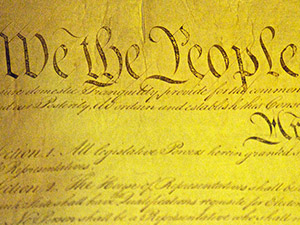
In celebration of Constitution Day this Sept. 17, CSUN’s Tseng College hosted its seminar to discuss issues related to the constitution on Sept. 7.
Tseng College has coordinated and hosted this event for ten years running, ever since the Omnibus Bill of 2004 said it’s mandatory for publicly funded educational institutions to pay tribute to our constitution in accordance with Constitution Day.
“It’s been a lot of fun, edifying, and enlightening,” said Marcella Tyler, executive director of program advancement for Tseng College. “CSUN is honored to participate each year in a nationwide celebration of this invaluable document.”
The seminar was led by CSUN History Professor James Sefton, and former CSUN Political Science Professor John Evans, who currently teaches at the University of Wisconsin.
“This is very important, it’s a public service event that brings people to the university to experience what the university does, which is encourage people to think,” said Sefton. “Young people have less understanding of the constitution then they should have.”
The main constitutional focus of the seminar was the General Welfare Clause. The speakers explained the implications this clause has on the legislative and judicial branches of the U.S. and how that affects us as citizens.
Sefton said the welfare clause is significant because it clarifies general welfare, and why and how it was created.
“[The General Welfare Clause] is the basis of modern electoral issues,” said Sefton.
The Orange Grove Bistro was packed with people from a wide range of ages, though the majority of attendees were senior citizens associated with Study Activity Growth and Enrichment (S.A.G.E.), a learning-in-retirement program affiliated with CSUN.
“There was a diverse crowd. It’s huge that people attend if we’re going to be good citizens and thats what’s so impressive, people attended. I’m so used to apathy in America, people don’t go to things dealing with politics, people don’t vote, they don’t do anything,” said Evans.
It’s vital that citizens recognize the rules and linguistic basis for which their country is run in order to make the most accurate and informed political decisions and to correctly correspond their beliefs into action in the form of voting.
“A democratic government only works if people know something about it,” said Evans. “Getting people to learn how their system works is incredibly important but only if they make the effort and they’re making the effort. This is totally cool.”






